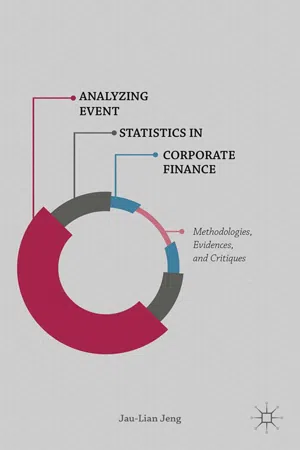![]()
Part I
Event Study Methodology I
![]()
Chapter 1
Data Collection in Long-Run or Short-Run Format?
Introduction
In this chapter, a critical question is raised for the empirical finance of corporate event studies. That is, what kind of data set should one apply? Should the short-run data set such as daily returns (or even high-frequency data) be applied? Or, should one try with the longer horizon data? A painful browse through all related literature shows that it is easy to find that there is no definite rule applied to this issue. One question often asked is whether the short-run returns contain more updated information or, the longer horizon data that may provide more insightful views since the impacts of corporate events may be persistent over time.
For the issues of mergers and acquisitions in particular, the controversies over the choices of data frequencies and study horizons remain unresolved even after decades since the pioneering study of Fama et al. (1969) on corporate finance. Various empirical findings of event studies in corporate finance can be found in many leading finance journals and elsewhere. Yet, these issues remain mainly unsettled. Throughout this chapter, these differences in sampling and data frequencies are surveyed and the related critiques are offered while using the event studies of mergers and acquisitions as the examples to depict the issues.
Some rules of thumb for the data selection issues are provided although they remain preliminary. The intent is to enlist some possible basic criteria to these empirical finance issues together so that consistency in analyses among them can possibly be fetched. First of all, the determination of sampled data frequencies should take into account the feasibility of social-ecnonmic/financial data and the relevancy of theoretical foundation of financial economics. In other words, reasoning with economic/financial theoretical arguments must take precedence when considering the search of data and the statistical methods to apply. In addition, the modeling for normal returns (especially for robust model specifications on empirical asset pricing models) should be cautiously examined prior to the event studies in using the abnormal returns. Lastly, stochastic properties of the data sampled (or constructed) should be thoroughly investigated and checked (using diagnostic tests or else) before any attempt to elaborate the hypotheses of interest.
Not surprisingly, shovelling data series with current computational facilities (or techniques) seems trivial among the empirical finance issues. Fabrication of intended results can be obtained using skills in data manipulation. The essence of event studies of corporate finance issues therefore, is not to present some eye-catching representations in showing the startling results of empirical finance. Instead, presenting the fact-related discussions based on robust specification, and devising some sound guidance for the finance professionals (academicians or practitioners) in developing analyses and making proper decisions are essentially needed in the future for empirical corporate finance.
1.1 Samples, Data Formats and Variables Selection
For many event studies in corporate finance, data collection becomes one of the most formidable tasks to study the hypotheses of interest. For instance, it is overwhelmingly evident that in financial economics/econometrics literature on mergers and acquisitions, many works endeavor to study the stock returns from the events either for the acquirers or the targets. While it is interesting, different data sets or frequencies of data collected may cause various empirical results or conclusions. Unfortunately, there is no definite rule to determining the length of sampled periods, event windows, data frequencies, and the sampling criteria. A challenging task for empirical finance in event studies of corporate finance may start from the decision of time horizon of the studies, the frequency of data, and the collection for event study data. Specifically, two major techniques for event studies in mergers and acquisitions are commonly employed: short-horizon event studies surrounding the merger announcements and long-horizon market valuation studies that discuss the benefits and consequences of the mergers and acquisitions. However, determining the time spans for these stock returns on corporate event issues is never straightforward. Roughly classified, some clarifications of the findings in these conventional event studies (in mergers and acquisitions, for instance) can be shown as follows:
1. the determination of time horizons and data frequencies depends on the possible hypotheses on persistence of the impact(s) and the feasibility of attributes/variables that are applicable,
2. the constructed data streams (whether from simulated series or from the raw data) for these hypotheses of interest may have some particular stochastic or statistical properties that can influence the statistical results of studies,
3. regardless of the time frames of studies, a correctly-specified model for normal (or expected) returns with systematic attributes or variables (based on capital market equilibrium) should be devised so that robust assessments on abnormal returns can be obtained for corporate event studies.
Although some statistical assumptions can be applied for the normal returns (especially for the short-horizon returns), incorporation with both statistical assumptions and economic modeling provides the essential features and explanatory specific...
